Fear is one of the strongest emotions that the body experiences on an instinctual level. Is it possible to turn grey from fear? To find the answer to this question, let’s take a closer look at the mechanisms of greying, the chemistry of fear and the versions of doctors and scientists on the subject.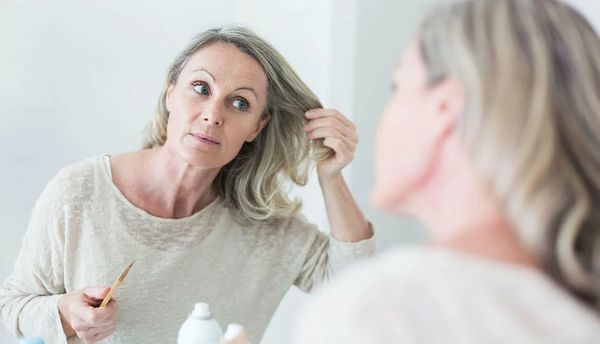
Table of Contents
Causes of greying
Hair turns grey due to the loss of melanin, which is synthesised in the epidermis and hair follicles under the influence of thyroid, pituitary, sex hormones and sympathetic nervous system hormones. Graying is caused by a decrease in melanin production by the body, physiological ageing of pigment-producing cells and hormonal malfunction.
Factors that lead to the appearance of grey hair can be:
- vitamin and micronutrient deficiencies in the hair,
- age-related changes,
- smoking,
- taking medications that inhibit melanin production,
- stress,
- prolonged emotional distress,
- hereditary predisposition.
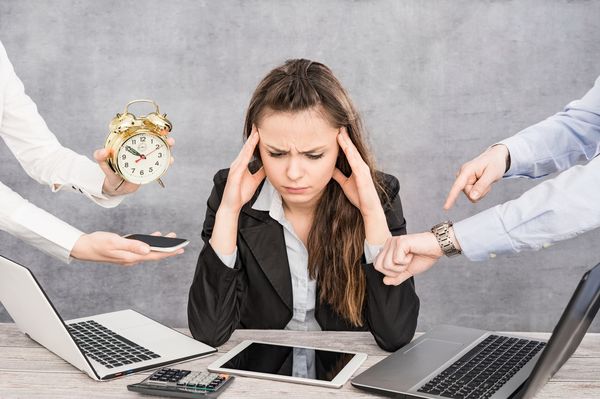
Age-related
Age-related hair greying starts around the age of 35-40 and progresses towards the age of 50. With age, melanin production decreases, resulting in air cavities in the hair structure that give the hair a white-grey colour.
The onset of grey in men and women is different. In men, age-related hair colour changes begin with the beard and temples, affecting vast areas at once. In women, grey hair starts appearing singly on the parietal and occipital areas. Over time, the amount of white hair increases.
Stressful situations
Stressful situations can lead to the premature appearance of white hair. Stress is the mechanism by which white hair grows:
- A person is under a lot of stress or fear.
- This leads to spasm of the blood vessels.
- Adrenaline and other fear hormones are released into the blood.
- The supply of melanin to the hair is blocked.
- Grey hair begins to grow.
- The part of the hair that was formed before the stressful situation remains coloured.

Real cases of rapid graying
The rapid greying is attributed by medics to the fact that in the event of severe stress, all pigmented hair falls out abruptly, leaving only the grey hairs. However, this theory does not stand up to criticism: a person who goes grey in this way should remain almost bald, which neverhappens. History has recorded many instances in which a person’s head has turned white from the horror they have experienced in a short time. Let us look at some of the more notable examples.
Thomas More
Writer Thomas More, working at the court of Henry VIII, refused to recognise the divorce of the king and Catherine of Aragon and did not take the oath of office to the new Anglican Church. For this, Thomas More was declared a traitor, imprisoned in the Tower and beheaded. Contemporaries of those events claimed that while in prison Mohr’s hair was as black as pitch and he came out to his execution with a completely white head. The fear, stress and terror of the execution may have caused the instant graying.
Marie Antoinette
Another historical figure who, according to contemporaries, turned grey one night before her execution. Queen Marie Antoinette was sent to prison where she awaited her sentence for several months. On the day of her trial she was charged with treason and sentenced to execution the next day. Eyewitnesses claimed that Marie Antoinette’s hair had already been cut white before the guillotine, though she still had her natural hair colour when she was on trial.
True stories
In 1982 pilot Eric Moody was flying a plane from Kuala Lumpur to Perth. The first engine failed over Java, followed shortly afterwards by the second engine. The pilot coolly landed the plane without its engines running, in Jakarta Airport. A year after this incident, the pilot went completely gray.
There are many stories in the media about people losing their natural colour in a very short time. There are many accounts of people who have aged in a matter of days because of extreme grief or shock. Scientists still know little about the body’s post-traumatic reactions to critical situations. The only thing that is certain is that sudden graying is evidence of a serious malfunction in the human body.
Fear chemistry
Real or perceived danger provokes feelings of fear. Fear is a defense mechanism in our psyche that instinctively kicks in. Some people see something frightening and close their eyes without thinking twice, distance themselves from danger, try to run away or hide. For others, when danger approaches, mental processes become more active and physical abilities increase. These two opposite reactions to fear are caused by the body’s same self-protective mechanism.
How it emerges
When dangerous situations arise, the senses send data to the brain, which immediately begins to stimulate the production of adrenaline, noradrenaline and cortisol. Under the influence of these hormones, a person begins to experience fear, which manifests itself outwardly:
- excessive sweating,
- rapid heartbeat,
- trembling, hair moving on the body and head,
- a dry feeling in the mouth.

The body thus throws all its energy into overcoming the threat and mobilising defence reactions.
Which hormones are produced?
When we feel stressed, the first hormone our body releases is noradrenaline. Noradrenaline does not cause a strong emotion of fear. It is the precursor to adrenaline, which regulates blood pressure, activates the centres of the brain, reduces pain sensitivity and increases motor activity. If the situation is more stressful than anticipated, the body starts to synthesise adrenaline at an increased rate.
Adrenaline causes increased heart rate, vasoconstriction of muscles, abdomen and mucous membranes, relaxation of intestinal muscles, and pupil dilation. Basically, it is adrenaline that adapts the body to cope with stressful situations. Excess adrenaline and prolonged exposure to stress exhausts the body and leads to premature ageing.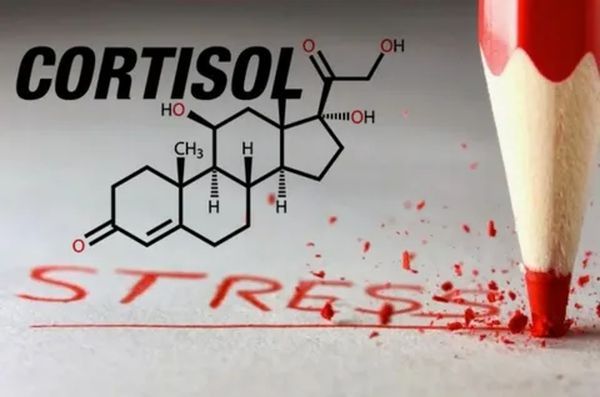
Cortisol is produced by the adrenal glands. It is a hormone that enhances glucose synthesis and reduces its breakdown in muscles. It allows the body to store energy to withstand danger. An increased production of cortisol occurs during prolonged periods of stress, when the body is tired of producing adrenaline in large quantities.
What’s the effect on your hair?
Long-term exposure to noradrenaline doesn’t have the same damaging effects as adrenaline or cortisol. Chronic stress (production of cortisol) leads to obesity, hormonal imbalances, which in turn leads to hair loss. Adrenalin is responsible for blocking melanin synthesis in hair follicles. The longer the fear emotion lasts, the more cortisol in the blood, and therefore the more hair loss. The greater the shock of fear – the more adrenaline in the blood, and consequently the faster the greying process.
Scientific explanation of the process
Researchers from Harvard University conducted experiments on mice to test the effects of fear on the melanin pigment. The black mice were frightened by light, shaken and given electric shocks. After a while, the mice began to grow white hair. Blood tests showed that fear had depleted the pigment-producing cells. The pigment was completely “removed” from the follicles by the stress.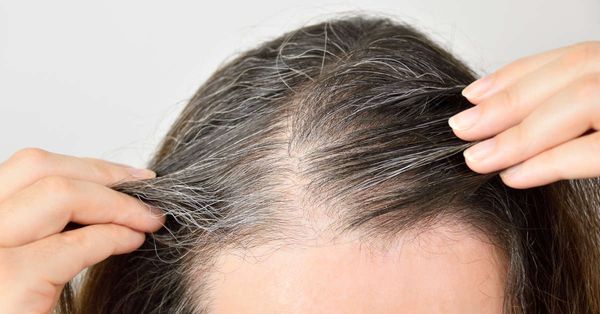
Extreme levels of stress cause the sympathetic nervous system, which is responsible for mobilising the body’s defences, to become hyperactive. The body’s response to stress and danger wears down the body, particularly the stem cells responsible for melanin synthesis. Research has proven that fear can cause the rapid and permanent loss of stem cells. Which means that fear does indeed make people age and go grey.
Preventing early grey hair
Even if early grey hair is part of heredity, a healthy lifestyle – plenty of exercise, good sleep and a healthy diet – can help prolong hair’s youthfulness. You can also delay the onset of white hair or slow down the ageing process with special salon treatments or with folk methods.
Salon treatments
The most effective treatments for fighting early grey hair:
- Laser therapy stimulates melanocyte growth and restores cell membranes.
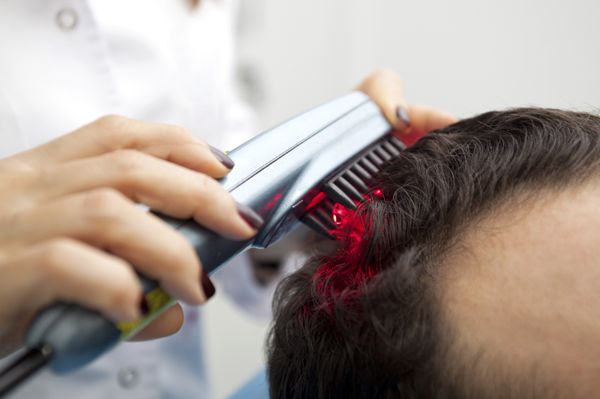
- Darsonvalization increases blood circulation, metabolic processes in cells, stops premature depletion of stem cells.
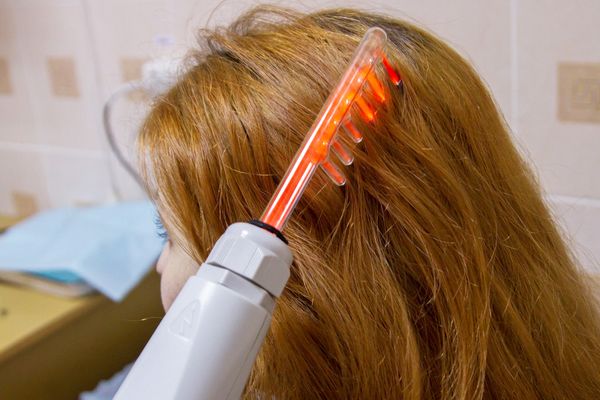
- Mesotherapy – injections of products rich in trace elements, nicotinic acid and melanin substitutes into the subcutaneous area of the scalp.
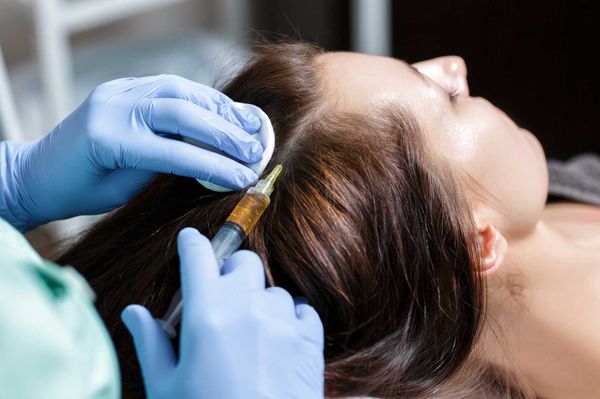
- Scalpultrasound activates the metabolic and immune processes in the cells, tones the scalp vessels.
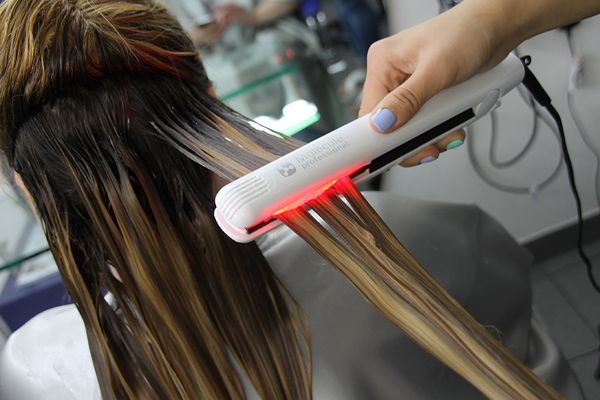
WARNING. For a greater effect, salon treatments are combined with head massages and vitamin preparations rubbed into the hair.
Nutrition
A healthy and balanced diet will help your hair retain its natural colour for longer:
- Meat contains a lot of proteins, vitamins B5, B12, which are responsible for maintaining youthfulness of the body.
- Vegetables are rich in vitamins and trace elements.
- Fish is rich in proteins and Omega-3 fatty acids, contains selenium and other substances that are involved in building hair.
- 10 almonds a day will save your hair from graying early. Nuts are rich in vitamins B and E and contain 40% of the daily allowance of calcium and magnesium.
- Dark chocolate is high in copper, which stimulates melanin production.
- Berries and fruits are rich in antioxidants that slow down overall aging.

IMPORTANT. Protein-free diets promote premature ageing and premature greying.
Folk remedies
Recipes for masks and vitamin cocktails for the treatment of early grey hair:
REFERENCES. Folk remedies and salon treatments only stop the emergence of new grey, they can not return the colour to the already white hair.
In medicine, sudden greying is called canities subita. The best explanation for this process is not that hair changes colour, but that pigmented hair falls out. A disease called ‘focal alopecia’ causes sudden hair loss, resulting in balding.
The causes of greying are to be found in the body. If you’re experiencing early greying, it could be caused by one of the 6 most common factors: Frequent and severe stress. It has been proven that stress and depression can slow down and reduce melanin production.


